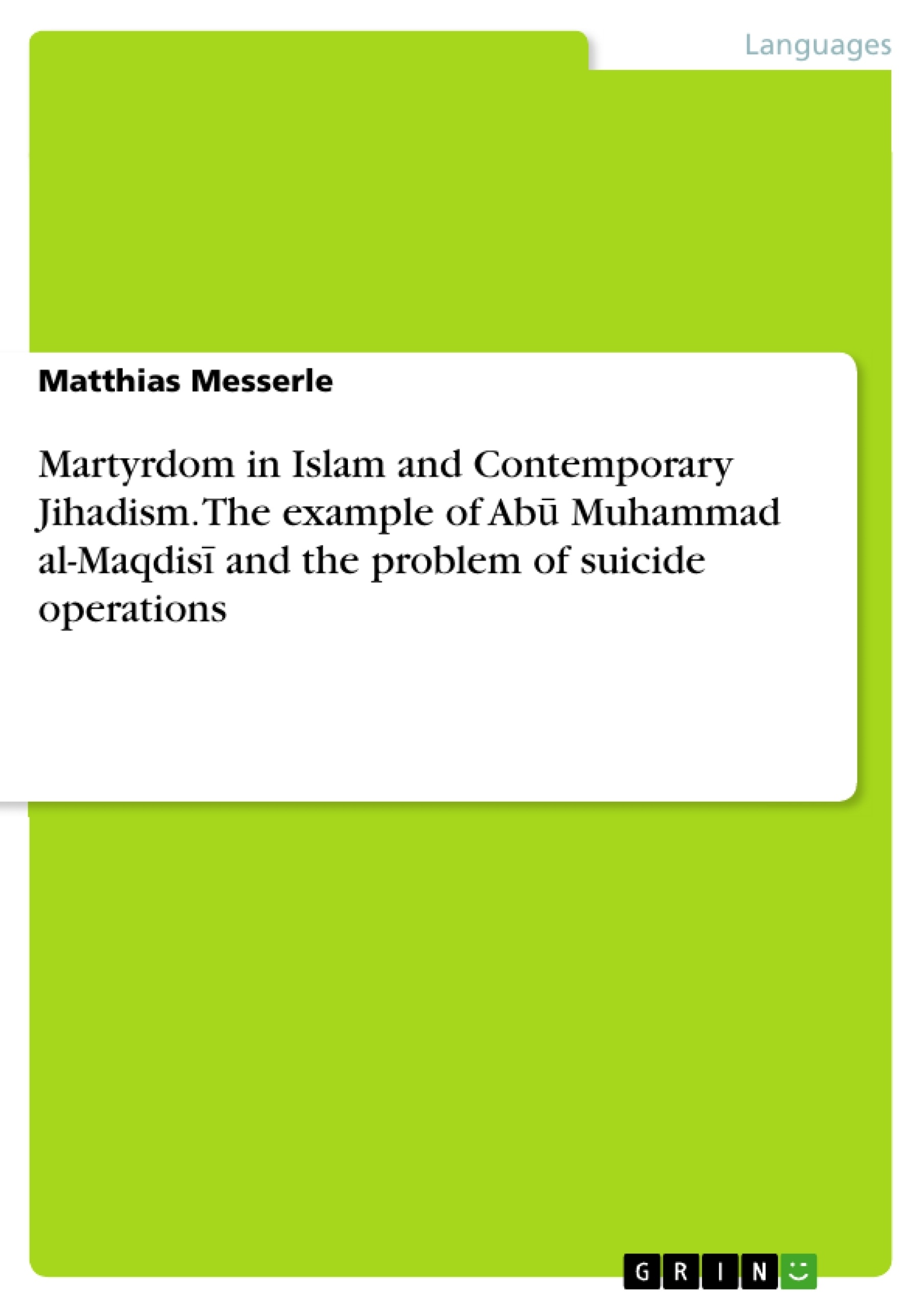This paper analyses the concept of martyrdom in Judaism, Christianity, and Islam. It gives a brief overview of the respective traditions and then jumps to present-day Jihadism and martyrdom in the context of violent Jihad. Thus the phenomenon of suicide operations is dealt with in historical and political perspective, not ignoring the theological-ethical discussion among Muslim and Islamist scholars. Who is a martyr? That is the question this paper is concerned with.
Inhaltsverzeichnis (Table of Contents)
- Introduction
- Martyrdom in religion
- General aspects
- Jewish martyrdom
- Christian martyrdom
- Martyrdom in Islam
- Qur'an
- Sunna
- Martyrdom in contemporary Jihadism
- Terminology
- Contemporary phenomena
- Sayyid Qutb
- Abū Muḥammad al-Maqdisī
- Suicide operations (‘amalīyāt fidā'īya)
- General aspects
- Yusuf al-Qaraḍāwī's position
- Al-Maqdisi on suicide operations
- Conclusion
Zielsetzung und Themenschwerpunkte (Objectives and Key Themes)
This paper explores the concept of martyrdom in Islam, examining its historical context and contemporary manifestations, particularly within the context of Jihadist ideology and activities. The paper aims to provide a comprehensive understanding of the concept by tracing its evolution in Judaism, Christianity, and Islam, highlighting the complexities surrounding contemporary Jihadist interpretations of martyrdom, and analyzing the debate surrounding suicide operations.
- The historical development of the concept of martyrdom in Judaism, Christianity, and Islam
- Contemporary Jihadist interpretations of martyrdom, focusing on the ideologies of Sayyid Qutb and Abū Muḥammad al-Maqdisī
- The debate surrounding suicide operations within Islamic thought, particularly within Jihadist circles
- The relationship between martyrdom and the concept of “striving in the path of God” (jihad)
- The role of religious texts and interpretations in shaping contemporary Jihadist ideology
Zusammenfassung der Kapitel (Chapter Summaries)
- Introduction: This chapter introduces the concept of martyrdom in Islam and its relevance to both historical and contemporary contexts. It highlights the significance of understanding the concept's development in various religious traditions, particularly in Judaism and Christianity, to gain a comprehensive view of its multifaceted nature. The chapter emphasizes the need to establish a clear terminology and a general understanding of contemporary Jihadist ideology, focusing on concepts such as militant jihad and martyrdom.
- Martyrdom in religion: This chapter provides a comprehensive overview of the concept of martyrdom in various religious traditions, focusing on the shared elements and variations in understanding. It examines the general aspects of martyrdom, including its historical definition and its significance as a personal witness to faith. It explores the concept of martyrdom in Jewish and Christian traditions, analyzing its key narratives and historical contexts.
Schlüsselwörter (Keywords)
This paper focuses on the concept of martyrdom in Islam, analyzing its historical context and contemporary relevance. Key themes include religious traditions, Jihadist ideology, suicide operations, and the interpretation of Islamic texts. The work examines the ideologies of significant figures such as Sayyid Qutb and Abū Muḥammad al-Maqdisī, highlighting the complexities of the debate surrounding martyrdom and its relationship to the concept of jihad.
Frequently Asked Questions
What is the concept of martyrdom in Islam?
Martyrdom (shahada) traditionally refers to giving one's life in the path of God (Jihad) or as a witness to faith, as described in the Qur'an and Sunna.
How do contemporary Jihadists interpret martyrdom?
Modern Jihadist ideologies, like those of Sayyid Qutb, often link martyrdom to violent political struggle and offensive warfare against perceived enemies of Islam.
Who is Abū Muḥammad al-Maqdisī?
He is a prominent contemporary Jihadist scholar whose views on suicide operations and the definition of a martyr are analyzed in this paper.
Are suicide operations ('amalīyāt fidā'īya) accepted in Islam?
This is highly controversial. While some scholars like Yusuf al-Qaraḍāwī have justified them in specific contexts, many others condemn them as suicide, which is forbidden.
How does Jewish and Christian martyrdom compare to Islam?
The paper provides an overview of all three Abrahamic traditions, highlighting the shared history of suffering for faith and the differing theological developments.
- Quote paper
- Matthias Messerle (Author), 2017, Martyrdom in Islam and Contemporary Jihadism. The example of Abū Muhammad al-Maqdisī and the problem of suicide operations, Munich, GRIN Verlag, https://www.grin.com/document/369421



